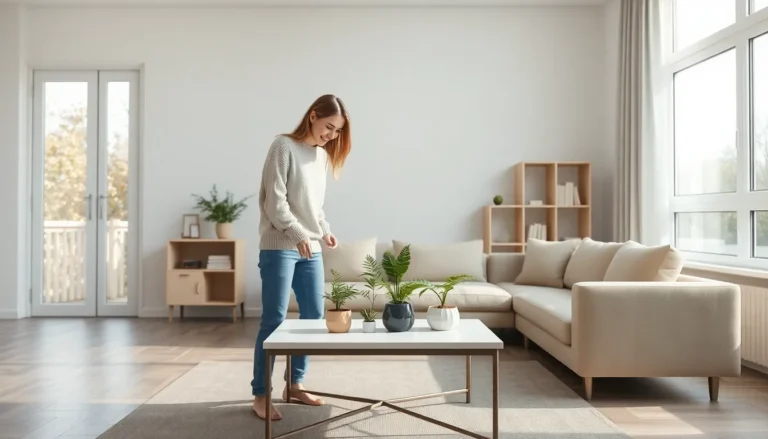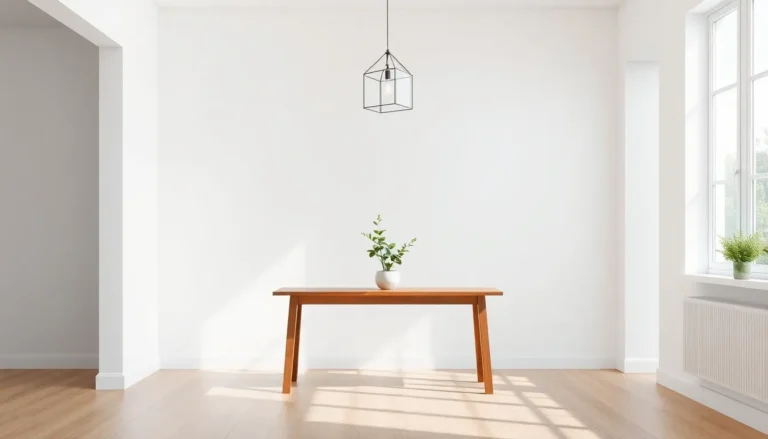Table of Contents
ToggleIn a world overflowing with stuff, embracing minimalism might feel like a breath of fresh air—or a deep sigh of relief. Imagine decluttering your life, not just your closet, and finding joy in simplicity. Minimalist inspiration isn’t just a trend; it’s a lifestyle that promises to free your mind and your space from the chaos of consumerism.
Picture this: fewer distractions, more focus, and the ability to actually find your keys when you need them. Minimalism invites you to strip away the excess and discover what truly matters. Whether it’s your home, your wardrobe, or even your digital life, adopting a minimalist mindset can lead to a happier, more intentional existence. So why not dive into this journey? It’s time to declutter not just your space, but your life—one joyful, minimalist step at a time.
Understanding Minimalist Inspiration
Minimalist inspiration centers on embracing simplicity in various aspects of life. It emphasizes reducing clutter and focusing on what truly matters.
The Philosophy Behind Minimalism
Minimalism promotes intentional living by encouraging individuals to eliminate excess possessions and distractions. This philosophy emphasizes what is essential, fostering deeper connections to people and experiences. Embracing minimalism often leads to a heightened sense of freedom and clarity, allowing individuals to appreciate the moments that genuinely matter. Individuals who adopt this mindset typically find joy in simplicity rather than material accumulation.
Key Principles of Minimalist Inspiration
Key principles guide minimalist inspiration, creating a roadmap for individuals seeking simplicity. Prioritizing quality over quantity remains essential, advocating for fewer but more meaningful possessions. Creating functional spaces that serve specific purposes improves overall well-being and productivity. Furthermore, adopting a digital declutter mindset enhances mental clarity by reducing digital distractions. Lastly, establishing mindful consumption habits fosters a thoughtful approach toward acquiring new items, ensuring alignment with one’s values and lifestyle.
Sources of Minimalist Inspiration

Minimalism draws inspiration from various sources that enhance its principles and philosophy. Exploring these influences fosters a deeper understanding of the minimalist lifestyle.
Art and Design Influences
Art movements such as Minimalism in the 20th century significantly shape contemporary design practices. Artists like Donald Judd and Agnes Martin emphasize simplicity and form, advocating for less ornamentation. Designers follow suit, creating spaces that prioritize clean lines and open layouts. Incorporating natural materials, such as wood and stone, strengthens the connection to minimalism. This approach facilitates a focus on functionality while allowing beauty to emerge through simplicity. The aesthetic movement encourages an appreciation for the essential, urging individuals to consider what truly matters in their environments.
Nature as a Guide
Nature consistently serves as a powerful source of inspiration for minimalism. Observing the simplicity and balance found in natural landscapes fosters a sense of calm. Elements like open spaces, clean lines, and organic materials reflect this minimalist ethos. By interacting with nature, individuals reconnect with their surroundings and clear mental clutter. Natural light, greenery, and fresh air enhance a minimalist lifestyle, promoting well-being. Embracing these elements creates a harmonious living environment, reinforcing the idea that simplicity leads to greater fulfillment.
Practical Applications of Minimalist Inspiration
Minimalist inspiration can transform everyday spaces and routines. Implementing these concepts leads to cleaner, more intentional living.
Home Decor Ideas
Prioritize open spaces by selecting essential furniture. Choosing multipurpose items saves room and enhances functionality. Incorporate neutral colors and natural materials to foster serenity. Use decorative elements sparingly, focusing on a few meaningful pieces to create a sense of calm. Arranging furniture with purpose encourages both movement and interaction. Integrating plants adds vitality while connecting individuals to nature, reinforcing the minimalist ethos.
Simplifying Everyday Life
Streamlining daily tasks fosters clarity and focus. Establishing routines eliminates unnecessary choices, making life more efficient. Declutter personal belongings, keeping only items that serve a purpose or bring joy. Embrace digital tools that promote organization, like calendar apps and task managers. Reducing distractions during activities, such as turning off notifications, enhances concentration. Cultivating mindfulness in consumption leads to better decision-making, fostering an intentional lifestyle that reflects minimalist values.
The Impact of Minimalist Inspiration on Mental Health
Minimalist inspiration significantly enhances mental well-being. Clear spaces promote clarity of thought, reducing anxiety and stress. Individuals often experience a sense of calm when surrounded by simplicity, as clutter tends to create visual distractions. Reducing physical clutter leads to mental decluttering, fostering improved focus and productivity.
Moreover, embracing minimalist principles encourages intentional living. This lifestyle inspires individuals to reflect on their true values and priorities, resulting in deeper connections with themselves and others. Mindful consumption practices help eliminate feelings of overwhelm, contributing to emotional stability.
Emphasizing quality over quantity in personal belongings can also create lasting fulfillment. When individuals invest in meaningful items, satisfaction increases, while superficial distractions decrease. Additionally, creating functional spaces that support daily activities enhances efficiency and reduces mental fatigue.
Cultivating a digital decluttering mindset further aids mental health. Organizing digital spaces and limiting device usage decreases information overload, allowing individuals to concentrate on what truly matters. Establishing boundaries in technology promotes healthier habits, leading to improved emotional resilience.
Nature serves as another source of minimalist inspiration. Integrating natural elements into living environments can boost mood and promote relaxation. Exposure to greenery and natural light positively impacts mental health by fostering a sense of connection to the outdoors.
Practical applications of these concepts can transform daily routines, resulting in a more intentional lifestyle. Streamlining tasks and establishing simple routines minimizes chaos, allowing individuals to navigate life with greater ease. By embracing minimalism, many discover a path to improved mental well-being and overall life satisfaction.
Embracing minimalism offers a pathway to a more intentional and fulfilling life. By focusing on what truly matters and eliminating distractions individuals can enhance their mental well-being and cultivate deeper connections. The principles of minimalist inspiration serve as a guide for creating spaces that foster serenity and clarity.
Incorporating elements from art design and nature not only elevates one’s environment but also promotes a sense of calm. As individuals embark on their minimalist journey they discover that simplicity isn’t just about physical decluttering; it’s about nurturing a mindset that values quality over quantity. This shift leads to a more meaningful existence where every choice reflects their true values and priorities.







